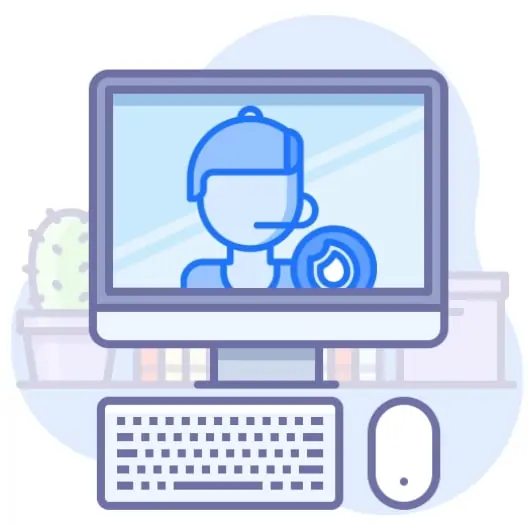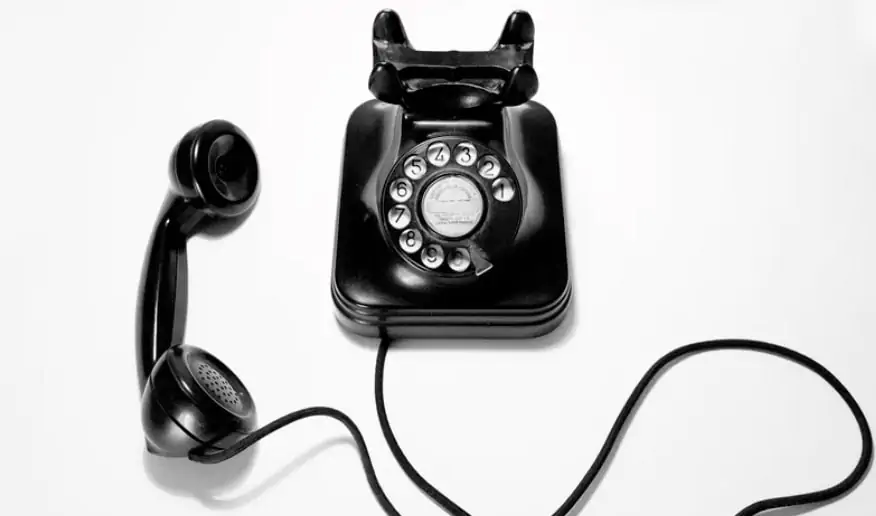2024‘s 17 Call Center Interview Questions + Answers [Free Guide]


Working as a call center representative isn’t for everyone. You need to have a strong character in the face of rejection, the ability to communicate clearly and positively and know how to sell.
The following call center interview questions and answers are for those of you looking for a new role and want the best chance of success in landing the job in 2024.
By studying these questions and the answers, you are sure to stand out among the crowd as you come across as well prepared, knowledgeable, and eloquent in your interview. Let’s get started!
2024‘s 17 Call Center Interview Questions + Answers

1. Why do you want to work at this call center?
This is most likely to be the first of all of the call center interview questions that you’ll be asked. The interviewer wants to understand why you have applied, and see how invested you are in the role.
Tips for answering this question:
- Research the company and provide facts from your research to show that you know about the company and are invested in the job.
- Share about how you go into this field and why you enjoy it.
- Explain your desires for future growth, as employers like to see that you are in it for the long-term, rather than this being a passing role that you will soon leave. Employers want to invest in long-term employees who will be an asset to their company.
2. Describe the role of a call center representative.
Answering this question will show your understanding of the expectations of the role. In this answer, share the definition of a call center representative, and also highlight the skills and proficiencies needed to be successful.
Example Answers:
- A call center representative will answer questions, provide solutions, and sell/promote products and services over the phone to existing and prospective customers.
- I would be the first contact for incoming/outgoing calls, which requires me to actively listen to concerns and questions in a friendly way.
- Assisting the customer is the main priority, and expressing my knowledge and patience in my communication is key as a call center representative.
3. What do you think are the most important skills for a call center representative to have?

Sharing that you know essential communication skills (see below) is important for the hiring manager to have confidence that you will be a good fit for the job.
Example Answer:
Strong listening skills, empathy and friendliness, clear speaking skills, problem-solving, and time management are the most essential skills to help customers effectively.
4. What is your process of selling/up-selling to customers?
For different companies and industries, the expectation to upsell or sell products and services to customers will be different. Some call centers may just be for taking in complaints and concerns, whereas others are about promoting the company’s offerings.
In the case of promoting offerings, share in the interview that you have a clear understanding of how to communicate with customers about products and services in a compelling and educated way.
Example Answers:
- If customers are calling about a specific service/product, then I would listen and be sure to reference our product list to identify similar products that they are after, as well as additions of upselling higher ticket items that meet their needs.
- By explaining the benefits of the products, especially if it is upselling, the customer will understand the advantage of purchasing this, therefore making him/her more likely to purchase.
5. What makes customer service great?
A call center representative is in the field of customer service, first and foremost. So having a strong customer service skill set is crucial.
Example Answer:
Customer service is about being able to empathize with a customer, on a human level, treating them with respect and patience to view the issues as if they were my own.
This allows me to problem-solve in a way that feels for them that they have been totally heard and that their concern is valid. Additionally, being able to act and rectify a situation that satisfies customers is also incredibly important.
Suggested Course: Build Your Skills In Customer Service (LinkedIn Learning) Get 1 Month of LinkedIn Learning FREE. 1000's of Courses, one price.
6. What is your process of handling dissatisfied customers?

This is one of the other most common call center interview questions, as it will likely happen in real-life, and employers need to be confident that you know how to handle this issue.
Example Answers:
- If a caller was disgruntled and angry, I would first put my focus on remaining professional and calm.
- I will be sure to still empathize with their concerns and listen for what their real issue is, underlying their anger and frustration.
- I would ask clarifying questions to be sure that we are on the same page about the issue, and I would express to them the steps I will take to move towards a resolution for them.
7. What is one of your best customer service experiences?
Being able to recount an experience you have had in your past roles that highlights your strengths is well received by prospective employers.
Tips to answer this question:
- Provide a real example with detailing the experience and what happened, rather than being vague and broad in your answer.
- Focus on an example where both the customer, and the company, benefited in the situation.
- Explain how the customer felt from the praise/feedback that was given so that you can reference their experience and not just your own.
- Share how this experience motivates you to continue to be a top customer service representative.
- If you have not any previous experience, it’s ok to say so. You could also share an experience where you might have helped a friend, family member, or even stranger.
8. Describe a moment where you made a mistake in your role, and how you handled it.
The interview needs to know that you have strong problem-solving skills as mistakes do and will happen. For this question, show when things went south, but don’t forget to include how you fixed the situation for a positive outcome.
Tips for answering this question:
- Only share an example that had a great outcome, and reveals your skills in your answers.
- Focus on explaining the solution, and what you learned in coming to that solution after the mistake.
9. What are some of your personal strengths that you bring to this role?

Now is the time to highlight yourself. Don’t try for false modesty here, as they want to hear about your strengths, so share them!
Example Answers:
- My cheerful and friendly character is definitely a big strength for this role, as I often get feedback from callers that they felt great and encouraged from our talk, having my energy lift their spirits.
- My time management is a strong skill, as I have always been organized with my tasks, whether personal or professional, and bringing this to the role, I am able to handle large quantities of work, with clear prioritization so that I never miss a deadline.
10. What are some weaknesses that you are working on?
Sometimes this question will be simply asked as ‘what are some of your weaknesses’… but the key is to share, in either case, that you are working on your weakness and actively willing to grow.
Example Answer:
One of my weaknesses would be my perfectionism, as I don’t like the feeling of making mistakes or things being inefficient.
Though this is also a strength of mine, sometimes it is a weakness when it comes to attaching to things being so perfect that I get hung up on the small details, when what is really needed is the willingness to try again, or try something else.
11. Are you comfortable with cold calls?
Some call center roles won’t need this, but others will. Be prepared to answer this in your interview in the case that cold calling is a requirement.
Example Answer:
Yes, I am comfortable with cold calls. I understand that it is part of the role and I am confident enough to communicate to prospective customers in this way.
12. How do you feel when faced with rejection from cold call situations?
Knowing how to navigate the challenge of rejection is key to being a call center representative, especially if you are cold calling.
Example Answer:
Quite simply, I don’t take it personally. That is key to being able to handle rejection with a shrug of my shoulders, knowing that it isn’t about me, it’s simply about them and their desire to receive what we are offering.
13. If you are given negative feedback from a customer, how would you respond to them and management?

This might happen in your role, so be prepared to answer this question if it comes up in your interview.
Example Answers:
- If the feedback is live on the call, I would express to them that I apologize that they feel that way, and I understand what they are saying. The most important thing is to not get defensive.
- In terms of management, I will share with them what happened, and talk about ways to stop this from happening again in the future.
Top Course: Customer Service: Problem Solving and Troubleshooting (LinkedIn Learning) Get 1 Month of LinkedIn Learning FREE. 1000's of Courses, one price.
14. What do you do when you don’t know the answer to a question that a customer is asking?
This is likely to happen, so be prepared to answer this as the hiring manager is looking for your ability to think on the spot and problem solve.
Example Answers:
- When I am asked a question that I am unsure of the answer to, I will not dismiss the customer and tell them I do not know, instead, I will ask them politely to wait for a moment as I explore their query.
- I would either search for the answer, or consult another member of the team, or a supervisor.
- If I cannot come to an answer at that moment, I would take the person’s details (email or phone) to get back to them at a later date after having searched for the answer.
15. What is your ideal working schedule?
This question is not about your availability, but your preferences in terms of working.
Tips for answering this question:
- If you share that you’d only like to work minimal hours, this will not look good. You’ll be seen as unmotivated or not a committed employee.
- If you have preferences for working some days or hours over others, share them, while also expressing that you aren’t attached and that to have consistent work is most important.
- If you have no preference and would work anytime at all – share that you have open availability and desire to work as much as needed.
16. What is your availability?
This is a more practical question, focused on when you can and can’t work.
Tips for answering this question:
- If you have open availability, let them know that there are no days or hours that are off-limit in terms of your schedule.
- If you have some days or times where you definitely can’t work, share the exact days and times and also why this is the case.
17. What questions do you have for me?
Asking questions to the hiring manager will show that you are engaged, interactive, and enthusiastic about the role.
Example Answers:
- How does a successful call center representative perform, and what defines their success, in your eyes?
- What does a typical day in this center look like?
- How do you describe the company culture?
To learn more, you can also see my other posts on interview tips and tricks, and also my guide on public speaking which can help during call center interview questions, and also with the role.
